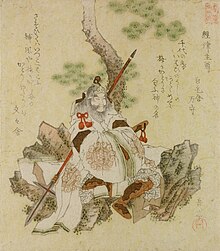| Futsunushi-no-Kami | |
|---|---|
God of swords and warfare | |
 Futsunushi no mikoto by Yashima Gakutei | |
| Other names | Futsunushi-no-Mikoto (布都怒志命, 布都努志命) Iwainushi-no-Kami (斎主神, 伊波比主神) Katori Daimyōjin (香取大明神) Katori-no-Kami (香取神) Katori-no-Ōkami (香取大神) |
| Japanese | 経津主神 |
| Major cult center | Katori Shrine, Kasuga Grand Shrine |
| Texts | Nihon Shoki, Izumo Fudoki, Hitachi Fudoki, Kogo Shūi, Sendai Kuji Hongi |
| Genealogy | |
| Parents | Iwatsutsunoo and Iwatsutsunome |
| Children | Ame-no-Naemasu-no-Mikoto |
Futsunushi (経津主神, Futsunushi-no-Kami, also 布都怒志命 or 布都努志命, Futsunushi-no-Mikoto), also known as Iwainushi (斎主神 or 伊波比主神, Iwainushi-no-Kami), is a warrior god in Japanese mythology. Also known under the epithet Katori Daimyōjin (香取大明神) after his shrine in northern Chiba Prefecture (historical Shimōsa Province), Katori Jingū, he is often revered alongside Takemikazuchi (the god of Kashima Shrine), with whom he is closely associated.[1] He is the general of Amaterasu and regarded as a legendary ancestor of the Mononobe clan,[2] and like Takemikazuchi is one of the tutelary deities of the Fujiwara clan.[3]
- ^ Namazu-e and Their Themes: An Interpretative Approach to Some Aspects of Japanese Folk Religion. Brill Archive. 1964. pp. 58–. GGKEY:2TUFXDJBJPN.
- ^ Como, Michael I. (2008). Shotoku: Ethnicity, Ritual, and Violence in the Japanese Buddhist Tradition. Oxford University Press. p. 121. ISBN 978-0-19-988496-4.
- ^ Grapard, Allan G. (1993). The Protocol of the Gods: A Study of the Kasuga Cult in Japanese History. University of California Press. pp. 39–40. ISBN 978-0-520-91036-2.